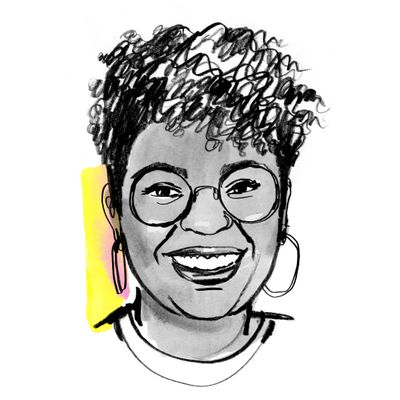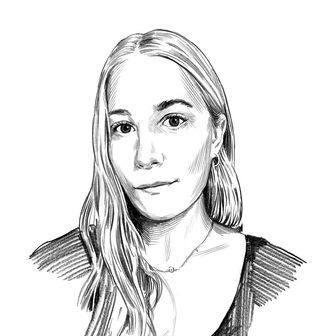
Rhiana Gunn-Wright, 31, is the director of climate policy at the Roosevelt Institute, a think tank with a focus on on curbing corporate power and reclaiming public power. Born on the south side of Chicago, Gunn-Wright is best known as one of the architects of the Green New Deal, the policy platform designed to transform the entire economy in order to prevent the most disastrous effects of climate change. Before working on the GND, Gunn-Wright was a Rhodes scholar, interned for Michelle Obama, worked in the Detroit Department of Health, and helped write over 200 policy papers for a progressive gubernatorial campaign. Now, she is pregnant with her first child and still fighting to make the Green New Deal a reality. Here, how she gets it done.
On moving back home:
I just moved from Detroit to River Forest, outside Chicago. I grew up on the south side of the city. I’m pregnant with my first child, and I wanted to be near my family. My husband is also from the Midwest. He’s the director of training at People’s Action, so he’s a grassroots organizer. We met in college — I’ve been with him since I was 19. We grew up together. Dealing with any early-20s man is not cute; we went through a lot of growing pains. But it’s really nice to have someone that knows you and has seen you go through that many stages of life.
On her own experience with environmental injustice:
From the time I was in the fourth grade, I would get bronchitis every spring and have to be out of school. My asthma would get really bad, and I would have to be on a nebulizer. Asthma was so common — so many kids had it around my neighborhood that my family treated it like a childhood disease. But when there’s that many cases of asthma, that is not normal. It is not normal that kids get hospitalized [for it]. I didn’t connect it to environmental factors until I had already been working on the Green New Deal for about a year. I had thought of environmental justice as a thing that happens to other people, only to find out like a year later it affected me.
On being a Black Rhodes scholar:
Grad school at Oxford was really hard for me. I learned a lot about myself. I wouldn’t change it, but it’s a very hard place to be Black, and to be a Black American in particular, because there were so few of us. They don’t acknowledge that their history is part of the colonial empire. And there’s very, very few Black professors; even having gone to Yale, that was something I had never seen. So few people have your cultural touch points. When you’re abroad, American identity is crystallized in some way, and then you’re expected to have all of the touch points, and all those touch points are largely white. You’re expected to know the latest Taylor Swift song or to know all the lyrics to “Don’t Stop Believing.” Especially when class comes in. I remember having so many conversations about hiking and camping because my Rhodes classes were overwhelmingly white people from upper-middle-class backgrounds. Like, my mom is a single mom from the south side of Chicago. I’ve never gone hiking. You were just expected to sit around and talk about family vacations.
On her serendipitous career path:
I got into the Green New Deal because I needed a job. I was the policy director on the Abdul El-Sayed campaign for governor of Michigan, and after the primary I had planned to just get a job for a bit and go to law school. My mom had always been after me to go to law school. Representative Ocasio-Cortez had endorsed Abdul, and I reached out to her campaign to say, “Hey, will you all need policy support?” Lo and behold, there was a new progressive think tank starting called New Consensus, and their first project was going to be a Green New Deal.
On building support for the Green New Deal:
Everybody loves to be the second, but no one wants to be the first. Because the currency for think tanks, for politicians, is political feasibility. When you talk about things that are “politically feasible,” it’s easy to sort of get laughed out of the room. We had talked to economic policy groups and a lot of folks were just like, “No.” One of the things that we got hit with very early is that people think progressives don’t understand the economy. The economy is coded as very white, very male, often conservative. They’re not going to listen to someone like me, right? With my background in policy and my degrees in African American studies and women’s gender studies. The Roosevelt Institute, where I work, was really the first group of economists to come out publicly in favor of a Green New Deal. I’ve been building a team of fellows and full-time staff who write about these issues and who are putting together the levers that we need to pull over the next couple of years to really start building toward the economic transformations that we need.
There are a lot of parts of the Green New Deal that [Joe Biden] has adopted that I think are great. But the reality is also that there still is not a willingness to, say, deficit spend on climate priorities, because it’s not seen as an emergency in the way COVID was. For me, at the core of the Green New Deal is a desire to change power relationships, whether that’s between public and private sectors, workers and employers, or people of different racial groups. We’re not just saying society should transform because then we’d have solar panels everywhere. We’re saying society needs to transform because these power imbalances are driving economic activity that is detrimental to the climate. Without that understanding of power, it’s very easy for it to just turn into, not the Green New Deal, but sort of like, How do we make this form of capitalism less carbon intensive?, which is not the point. I see some embrace of that by the administration, but not a full embrace.
On the women who inspire her work:
I come from a line of women that do care work. My great-grandmother washed laundry in Mississippi for white families. Then my grandmother, her first jobs were as a domestic in a couple of white houses. My cousin is a nurse. I think about the nursing assistants who would take care of my great-aunt in her nursing home. I’ve seen so many Black women in scrubs waiting on the bus in Detroit. These were women who looked so hard. Especially now that I’m pregnant — my first trimester I was like, There is no leave for this? This is wild. I’m so tired. I just remember seeing those women in scrubs and some of them were pregnant. Those women should be millionaires.
I try to recognize that class is a thing, and I will never pretend that my social class is the same as it was when I was growing up or just by nature of being Black. It’s important to make sure I’m not caricaturing people or pretending that I’m more in touch or know more than I do, but I do try to remember the conversations I’ve had with folks. It sounds really corny, but I try to remember the humanity that they have, who they are as people. The ways that they laugh or the things that they said about their jobs that were really hard.
On dealing with climate anxiety while pregnant:
It’s been flaring in particular right now during this infrastructure fight. I had a moment the other day where I was like, Will I have to tell my child we’re gonna die because of the filibuster? Before we thought about having kids, that was something I would hear, you know, “I don’t want to bring kids into this messed up world,” et cetera. And it resonated. But I thought about how as a Black woman, my ancestors had children on slave ships or in slavery. My great grandmother had her children in segregation. My mom will talk about being in race riots at her high school, where she was the first Black student-body president. If they had decided not to have kids, I wouldn’t be here. I had a conversation with my grandmother about my work. She said, “I didn’t have a degree, but now you can go out and you can say people deserve health care. And people listen to you.” It’s a sort of continuation — children having children is sort of like an act of hope, like a belief that they can do a thing that helps this place get better.


